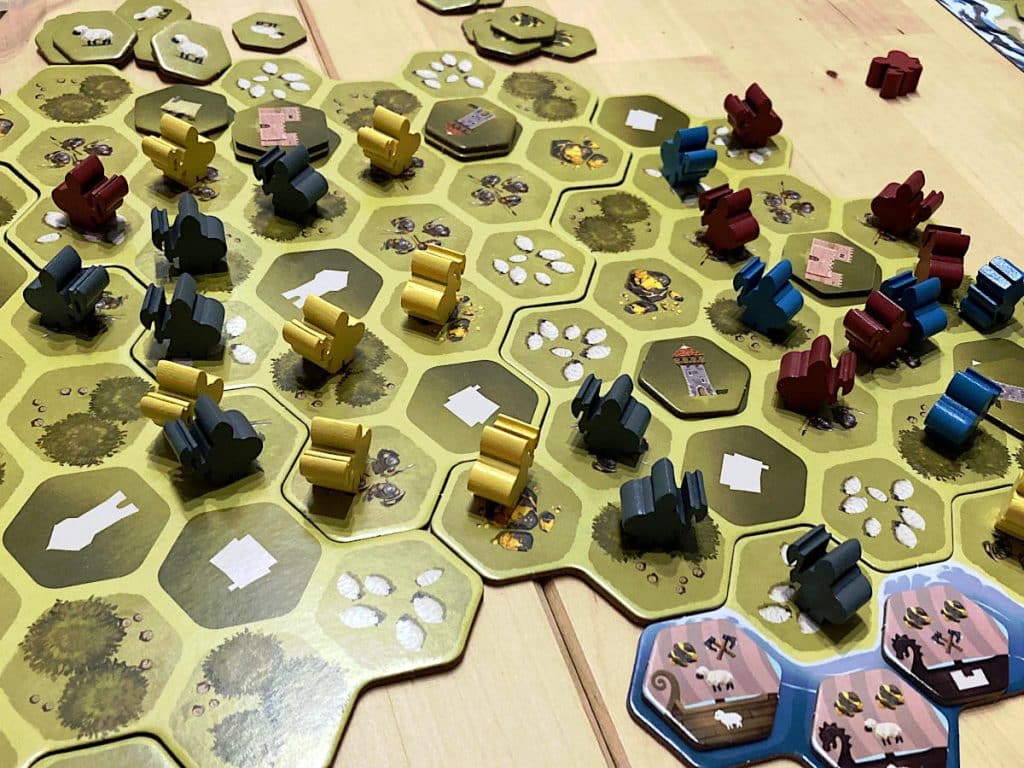I know that some people hate player interaction. They prefer a multi-player solitaire experience, where they are in full control of their destiny. If they win, it’s down to how well they played. However, I quite like player interaction, both negative and positive. Being able to form temporary alliances that are eventually broken or having a way of stopping another player from getting too far ahead can be fun for me. So in this article, I want to look at player interaction in a bit more detail.
Listen to the Audio Version
Intro Music: Bomber (Sting) by Riot (https://www.
Leave by Sascha Ende
Free download: https://filmmusic.
License (CC BY 4.0): https://filmmusic.
Player interaction comes in different flavours and different games have different levels of player interaction. There are games where you have to help other players, which is positive player interaction and there are games where you can influence other players negatively, which is why it’s called negative player interaction. Negative player interaction can be minimal, maybe limited to a shared offer row of cards, or it can be more heavy-handed, such as being able to take other players’ resources.
Worker placement games are an example of games with relatively strong negative player interaction. Action spaces are limited and when someone has taken one, nobody else can go there. So you can easily block someone else from being able to do what they had planned, even though often the action you take to block them doesn’t necessarily benefit yourself.
Player interaction can also take more interesting forms. There are games where player interaction is a lot more subtle. In these games, it’s not simply about blocking others or taking the cards or resources they need. The effect of your actions may not become clear until much later in the game.
Brass: Birmingham
Brass: Birmingham is one of my favourite games where player interaction can be quite obvious and direct, but more often than not it is a lot more subtle and indirect. On the one hand, you can quite easily block other players and directly affect their game by building industries in prime locations. On the other hand, when you connect everything up with canals or train tracks, you not only benefit yourself, but you can potentially give other players more options too. Suddenly it’s a lot easier to ship coal and beer around the country and for everyone to use each other’s resources.
If you haven’t played the game before, let me briefly explain what I mean. To build anything, you always need resources, usually in the form of coal, iron or a mix of both. So you might decide to build a coal mine to allow you to then build something else that needs coal. You need to have access to that coal to do so, but that’s not too hard. If you isolate yourself, you can easily ensure only you can use the coal you mined. That’s great, because not only do you get to build things, but once the coal has been used up, you get points.
However, as your coal mine gets connected to other locations via canals or train lines, other players can use your coal. That means they can build what they need and you still get your points when the coal runs out. That’s great, but it can also be a problem if you need the coal yourself. Of course, you can potentially use other players’ coal as well to get you out of trouble.
It’s these subtle interactions that make this game so interesting and exciting.
18xx
Games in the 18xx genre have a similar sort of subtle player interaction. You sort of want to keep your railways separate, but if multiple companies are connected up, they can build out the network more quickly. They can benefit from each other’s work. So if you can control both companies, then you’re laughing all the way to the bank. That type of player interaction in 18xx games is very similar to that in Brass: Birmingham.
However, there is another level and that’s share ownership. If you buy shares in successful companies, you can benefit from another player’s good performance. You may not do as well as them, because you’re probably going to have fewer shares, but you’re still doing all right. In fact, there is no need for you to control any companies. Even without being president of any train company you can still make a good profit.
Additionally, if you sell your shares at the right time, you can lower the company’s share price so much, that the other players suffer so heavily that they won’t recover. Alternatively, you can be the president of a company and run it into the ground, then dump your shares and leave someone else holding the reigns. Suddenly it’s their problem where they get their next locomotive from that they need to run the company.
The selling of shares in 18xx games can be brutal and is possibly one of the most direct negative player interactions I have seen in games. Yet, it’s also one of the reasons why these games are so exciting to me. If you can predict how a company will fare, you can really profit from it. Get it wrong and you’ll suffer the consequences.

Looot
A game with a different kind of subtle player interaction is Looot. Resources in the game are limited. So if you desperately need something, you need to be quick and get it before it’s gone. However, that’s not as simple as you’d like. You can’t just go somewhere to get whatever resource you want. Where you can place your Viking worker meeple on the map depends on where the other meeples are. So a space that gives you sheep may not be in reach. Of course, you can slowly work towards it or hope that the other players make a path there, but even then you’re not guaranteed to get it.
Now, while I don’t think it’s actually that easy stopping someone from getting what they need, I think it is not easy to always get what you want. If you place your Viking on a space that gives you access to the required resources on your next turn, it’s not guaranteed that someone else won’t go there before you and block you off. That’s especially true later in the game, when everyone has locked down their own board with longship scoring tiles that need specific resources. It becomes possible to tell if someone needs wood or gold or sheep and if you’ve kept your own options flexible, you can block them. Chances are though, that you block another player more by mistake than intent.
So the level of player interaction in Looot is rather low, but it is there and it’s not necessarily subtle either. Especially when it comes to buildings. You can see if someone is trying to connect up two towers or make a long chain towards a castle. Cutting them off is a good possibility, unless the other player still has their special actions available.
How About You?
So these are some examples of games with player interaction that’s not necessarily your standard fare. I’m sure there are many more, so if you can think of any, please share them in the comments below. Also, are there any games that you like that have heavy negative player interactions? What is it about these games that you like so much? Or do you prefer positive player interaction? What games of that type would you suggest? Please suggest them in the comments below. I’d love to hear from you.
This blog is free for everyone, but if you'd like to support it, here are some options.
Useful Links
- Brass: Birmingham review: https://tabletopgamesblog.
com/ 2023/ 04/ 01/ brass-birmingham-deluxe-saturday-review/ - Loot review: https://tabletopgamesblog.
com/ 2024/ 10/ 19/ looot-saturday-review/
2 Comments
What are you thoughts?
Add your thoughts on the topic to the form below and join the conversation.
Audio Version
Intro Music: Bomber (Sting) by Riot (https://www.
Leave by Sascha Ende
Free download: https://filmmusic.
License (CC BY 4.0): https://filmmusic.
Playlist
These are the songs I listened to while I was writing this topic discussion article:







Good examples, I actually love player interaction myself. It adds to the strategy to be honest. The wildcard needed to make things more enjoyable.
Hello Speelgoed. Thank you for your comment. It’s nice to hear that you also love player interaction. It certainly adds spice to games.